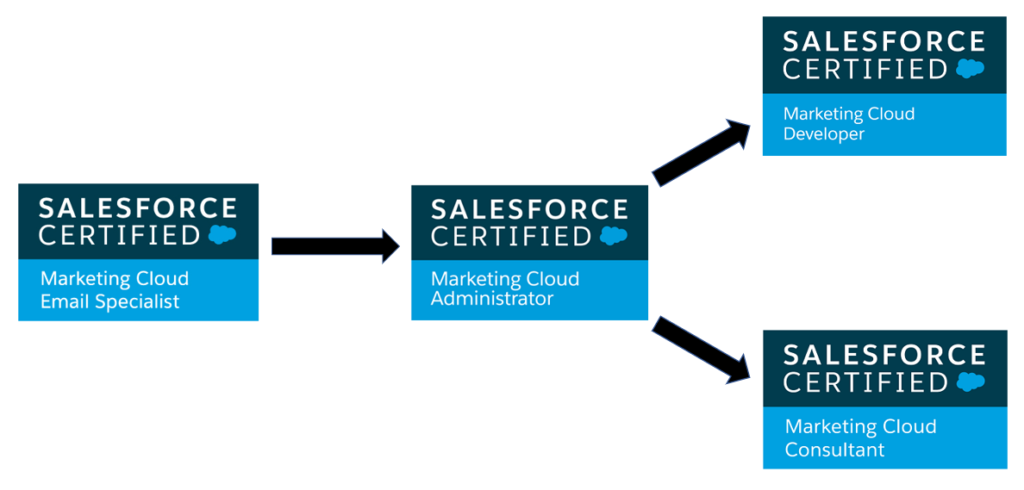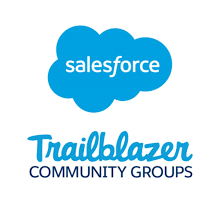Salesforce Marketing Cloud Certifications – which one(s) should I pursue?

I have been receiving multiple requests from our community members on the certifications related to Marketing Cloud – so let me jot down my experience and tips. Many of you may be new to Marketing Cloud – and might be wondering where to start. Some of you may already have one or more certifications already and are looking for tips to pass the next one. I’ll try to cover inputs for both audiences here.
First, for folks who are new to Marketing Cloud – you will come across 4 certifications – namely:
- Marketing Cloud Email Specialist
- Marketing Cloud Administrator
- Marketing Cloud Developer
- Marketing Cloud Consultant
The Email Specialist and Consultant certifications have been there for a while whereas the Developer and Admin ones were launched recently. Now the question arises as to which one should you take first – and is there a recommended order? My personal recommendation would be to go with Email Specialist first – followed by the Admin one. And then depending on your role – Developer (if you are technical) or Consultant (if you play more of functional role) – or even both if you have the experience. The Email Specialist is a pre-requisite for the Marketing Cloud Developer certification whereas the Marketing Cloud Admin is now the pre-requisite for the Marketing Cloud Consultant certification.

The reason I recommend to start with Email Specialist is that it is one of the most commonly used Marketing channels – and it covers the basics of the platform, which makes it easier for someone new, to slowly learn the various studios and builders in Marketing Cloud. The modules for Email Specialist mainly covers the Subscriber Data Model (Lists and Data Extensions – which I highly recommend all newbies to start with first), functioning of the Email Studio tool including how to create and send emails, best practices on Email marketing, as well as an overview about Marketing Automation with Automation Studio and Journey Builder.
The Admin certification takes it up a notch – you’d add to whatever you had learnt in Email Specialist and visualize from the perspective of an adminstrator. For e.g. in Email Specialist, the focus was more on the Subscriber Model – as you move outside Email, suddenly you get introduced to the Contact Model and how it forms the basis of the Marketing Cloud platform. A lot of weightage is given to knowing what to do when there is an issue or how to enable / disable a specific feature. Also you’d now go beyond Email Studio and cover few of the additional channels like Mobile, Social and Advertising Studios. You’ll need to know how integrations using Marketing Cloud Connect, Google Analytics, and Distributed Marketing work. There’s also more focused questions on scenarios in Automation and Journeys that an Administrator may usually run into.
The Developer certification transitions slowly into technical areas while keeping some of the basics such as the Contact Model and Security (which are also covered in Admin). There’s focus on how to handle automation activities from a developer perspective. You’ll need to get familiar with programmatic languages such as Ampscript and SSJS especially for personalization in Email, Mobile and Web channels – as well as learn how to use SOAP and REST APIs with Marketing Cloud. In Email Specialist and Admin, you’d have come across various scenarios where you’d utilize features from within the UI – like Sending Emails, setting up User Initiated Sends and Triggered Sends, configuring Journeys and Automation Workflows and Data Management activities. When you get to the Developer certification, you’ll need to learn how to know invoke some of these programmatically – like using APIs to inject a contact into a Journey. So as you can see, there’s a logical progression from one certification to the other where you build on what you have already learnt.
The Consultant exam is by far, in my opinion, the toughest of the lot. You’d really need to use all of your expertise and learning from the other certifications – not to mention having strong hands-on experience really counts. The questions would be more focused on how you’d handle situations and scenarios as a Consultant – so even though there may be few options that may all look correct, the answer lies in choosing the best possible option or strategy. Those of you who have taken the Salesforce Consultant exams earlier would find a similar pattern here as well.

For those of you who do not have access to a partner or hands-on org, I’d recommend you to find a mentor or buddy who does have access and willing to spend some time to show you the various features in Marketing Cloud. You can go through Trailhead and documentation – but most people struggle with not being able to visualize the functionality unless they experience it or see it in action. Please do check if you have a local B2C Marketers Trailblazer Community Group – if you do, then please join them and find a mentor who would be willing to help.
Now that I have covered the recommeded path, let me move to some of the study areas to focus on for each of the certifications:
- Marketing Cloud Email Specialist
- Marketing Cloud Administrator
- Marketing Cloud Developer – to be updated soon!
- Marketing Cloud Consultant – to be updated soon!